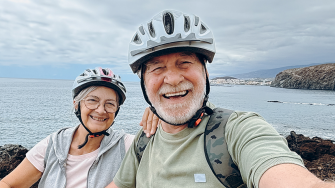What is ‘super-ageing’ and should we all be striving for it?
Blog: The Brain Dialogues
Blog: The Brain Dialogues

Increasing age is associated with disease and decline and is the most significant risk factor for dementia - but what about older people who are not declining and may even be thriving into advanced ages?
So-called ‘super-agers’ have been defined in various ways but are generally identified as older individuals who have memory and/or other cognitive abilities that are better than expected for their age, have abilities similar to much younger adults and/or maintain their cognitive abilities over time. These individuals may have fewer health concerns and be more physically robust and socially engaged but there is considerably less research on these aspects of ‘super’ ageing. Turning the focus onto older people who are living well could counter some of the stigma around ageing.
In fact, a recent study has shown that exposure to media portrayals of ‘super-agers’ resulted in less ageism and more positive perceptions of ageing among young adults.
Our recent study asked 39 adults aged between 65 and 101 that question. Most of them thought that identifying super-agers was a positive thing but our current definitions are limited. We could consider super-ageing in a broader sense and tailor it to an individual’s life circumstances, abilities and what they enjoyed. As one of our participants said, ‘It depends on what you want to achieve. Not everybody wants to work with their brain and not everybody wants to work with their back.’ Another described super-agers as ‘…people who have the physical and cognitive ability to be able to think of themselves as not old.’ Attitude to ageing was seen as extremely important in remaining engaged and interested in life, staying active and coping with any setbacks. Planning for the sort of older age you wanted to have was one idea proposed. However, life and health circumstances can only be controlled up to a certain point and escaping serious disease was also seen as a matter of luck – ‘it’s happened to you or it hasn’t happened to you.’
Living well and enjoying life rather than living for an exceptionally long time was a goal for many.
It likely takes a good dose of luck and unfortunately life circumstances can derail an otherwise positive trajectory into older age. We do know that super-agers are more likely to be female and to be more physically and mentally active in later life. One study showed they were more likely to have a musical background, either as a profession or a hobby. They are less likely to smoke or have diabetes and they have been shown to have more positive social relationships and better mental health. Super-agers’ brains look younger on brain scans. Their brains are typically larger than others the same age with more average abilities and this is especially seen in memory areas such as the hippocampus and areas important for social relations like the anterior cingulate. Their white matter, which can be thought of as the ‘wiring’ of the nervous system also has been shown to be in better condition. Interestingly, the brains of some super-agers have now been examined after death and Alzheimer’s disease and other brain pathologies have been identified. Blood tests have also revealed markers of brain disease in super-agers. This suggests that super-agers don’t escape these brain diseases but may be more resilient to their effects.
Super-agers are by definition an exceptional group and a minority. However, they are also just the top tier of a larger group who could still be considered to be ageing well. They may have a lot to teach us about how to prevent dementia and maintain good brain health. We already know that becoming a super-ager is more likely if you look after your health including your mental health and keep active. Our societies and institutions can make this easier by combating negative stereotypes about ageing including in the workforce, making community spaces inclusive and funding programs to support older people in keeping active and healthy. We all have the potential for an enjoyable and fulfilling later life.
"As our research participants said, the attitude we bring to ageing as individuals and societies is key."